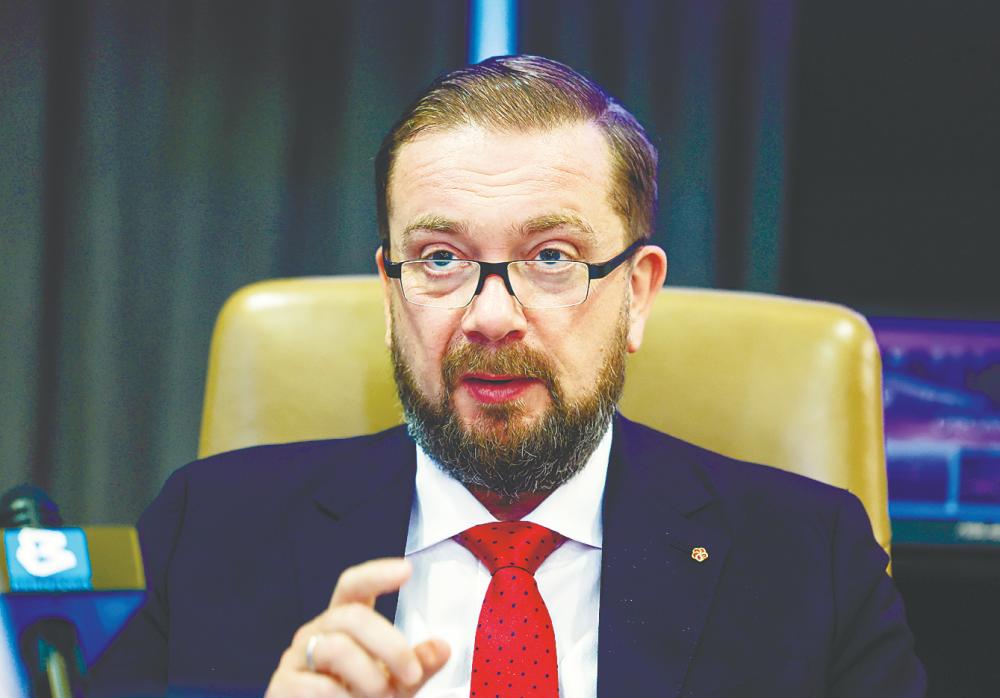KUALA LUMPUR: Malaysian companies are encouraged to explore the vast opportunities offered by Russian businesses, particularly in digitalisation and information technology (IT), said Roscongress Foundation.
CEO Alexander Stuglev said with its extensive experience in digitalisation and IT, Russia could offer Malaysia cutting-edge solutions in areas such as cybersecurity, software development and telecommunications.
“Both nations can exchange best practices by integrating digital technologies into public services, smart cities, and industrial applications,” he told Bernama at the World of Opportunities: Russia-Asean International Business Forum here on Tuesday.
Stuglev pointed out the significant potential for collaboration between Russia and Malaysia in the renewable energy sector. He said Malaysia aims to produce 70% of its electricity from renewable energy sources by 2050, while Russia, in turn, is ready to share its expertise in the development of wind, solar and hydropower energy.
Stuglev said despite global challenges, the partnership between Malaysia and Russia continues to flourish, with notable growth in trade, finance and energy cooperation.
In 2023, trade turnover between Russia and Malaysia rose by 11% to US$3.11 billion (RM13.7 billion) versus US$2.79 billion in 2022 .
Malaysia’s exports to Russia grew by 13% to US$619.3 million in 2023, while Russia’s exports to Malaysia rose by 10.8% to US$2.49 billion.
“Malaysia’s exports in the electric and electronics sector to Russia grew by 96.9% to US$154 million. Industrial goods remain the foundation of Malaysia’s exports, increasing to US$575.1 million in 2023 from US$499.3 million in 2022,” he said.
Meanwhile, imports from Russia rose to US$2.05 billion in 2023 from US$1.4 billion in 2022.
Prime Minister Datuk Seri Anwar Ibrahim at the recent BRICS Summit in Kazan, highlighted that Malaysia’s BRICS membership strengthens its trade and economic cooperation with Russia and other alliance members.
“BRICS membership provides access to the markets of member countries, including Russia, thereby boosting exports and imports. The alliance actively promotes investment cooperation among its members.
“This enables Malaysia’s companies to explore opportunities in Russian projects related to energy, infrastructure, and technology. Conversely, Russian investors can consider projects in Malaysia, particularly in high-tech and manufacturing sectors,” he said.
Stuglev said both countries have substantial experience in the energy sector. There is significant potential for joint projects in oil, gas, and renewable energy within the BRICS framework.
He stressed that the Roscongress Foundation is committed to facilitating collaboration via key events such as the St Petersburg International Economic Forum and the Eastern Economic Forum.
These forums serve as platforms to discuss BRICS cooperation, foster business connections, advance joint projects, and formalise agreements between Malaysian and Russian companies, he said.
Roscongress Foundation is a socially oriented non-financial development institution and a major organiser of nationwide and international conventions.
Stuglev said the Strategic Programme of Trade and Investment Cooperation “Russia-Asean” is set to be signed in 2025.
The document introduces new areas of collaboration and clear indicators to evaluate the effectiveness of joint projects, building on the current 2021-2015 roadmap.
“Economic relations between Russia, Malaysia and Asean have significant potential for active growth over the next five years. There have been active engagements in trade, investment, digitalisation, creative economy and tourism over the past year.
“Additionally, climate cooperation has become a key focus area. In August, Russia and Asean held their first expert consultations on climate, with plans to continue such meetings regularly,” he said.
In 2023, Russia’s trade turnover with Asean countries rose by 14.6%, reaching a record high of US$22 billion. This growth continued into 2024, rising to US$17 billion year-to-date, reflecting a strong mutual interest and a readiness to deepen collaboration. – Bernama









